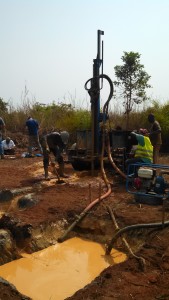
Workers drill a borehole with a rig and drilling mud as Zack Lepchitz and Dillon Hall examine soil cuttings.
OXFORD, Miss. – In Africa, there is a saying: “Cross the river in a crowd and the crocodile won’t eat you.” Or, in the words of the Dalai Lama, “Universal humanitarianism is essential to solve global problems.”
Western visitors to the low, sandy terrain of the West African nation of Togo find a world far different than where they live. It is a world where locals drink polluted water from the same open source. A world where resources are scarce and where health care and education are not always options. A world unlike this one in many ways but connected through its people and their desire for a stronger community.
A team of faculty members and students at the University of Mississippi, all members of the UM chapter of Engineers Without Borders, is working to help residents of one village strengthen their community. Among them is Cristiane Surbeck, an associate professor of civil engineering who is committed to “actually doing” good for this community to make a major impact on the people who live within it.
“I hope to help the people of Togo with projects that require engineering labor and teach UM students how to be engineers,” Surbeck said.
Engineers Without Borders is an organization of engineering professionals, academics and students who are dedicated to the empowerment of impoverished communities abroad. They travel to places such as Togo, bringing with them resources that strengthen and encourage the communities they adopt.
These resources include students and faculty educated in engineering, as well as manpower and useful tools for building.
In the last four years, members of the UM chapter have dedicated themselves to helping the small village of Hedome.
The children of Hedome aspire to be doctors and layers and engineers; some even hope to be congressmen. Learning, however, was difficult without a school.
In 2012, the UM chapter of Engineers Without Borders recognized the community’s need for a place of learning, where the children of Togo could be encouraged to expand their education. The chapter collectively developed plans for an infrastructure and raised funds to start work.
After much hard work, a schoolhouse for the children of Hedome village was completed. The school has been the group’s greatest accomplishment thus far, Surbeck said.
Vera Gardner, a senior mechanical engineering major from Memphis, Tennessee, agreed.
“When we saw the students attending classes and learning in their new schoolhouse, it showed that the community’s efforts and the UM-EWB chapter’s work was being used for its intended use and a good cause,” he said. “Everyone’s hard work paid off.”
With this great accomplishment, the chapter members have plowed forward into their next project, the installation of a deep water well in the village of Akoumape. The UM chapter began planning the project in January 2016, and it remains in development.
This deep water well will replace the shallow well that the village has been using. A deeper well means cleaner water both for the residents and for a local children’s hospital in the village. This installation will mean all-around better health and should help to energize the Togo community.
“When we complete the job, I can see the faces of the people we are helping.” said Zack Lepchitz, a UM graduate student in geological engineering who is involved with the developing construction projects in Togo.
Students involved with the chapter’s trip to Togo “are learning the technical and social skills necessary to complete a construction project to the client’s satisfaction,” Surbeck said.